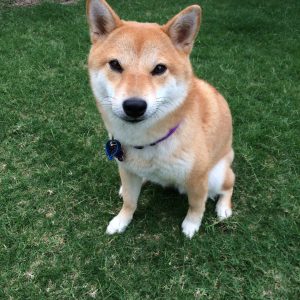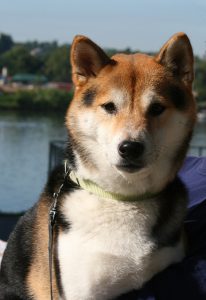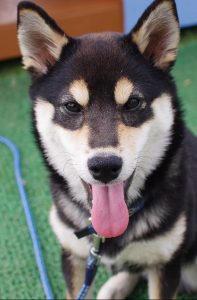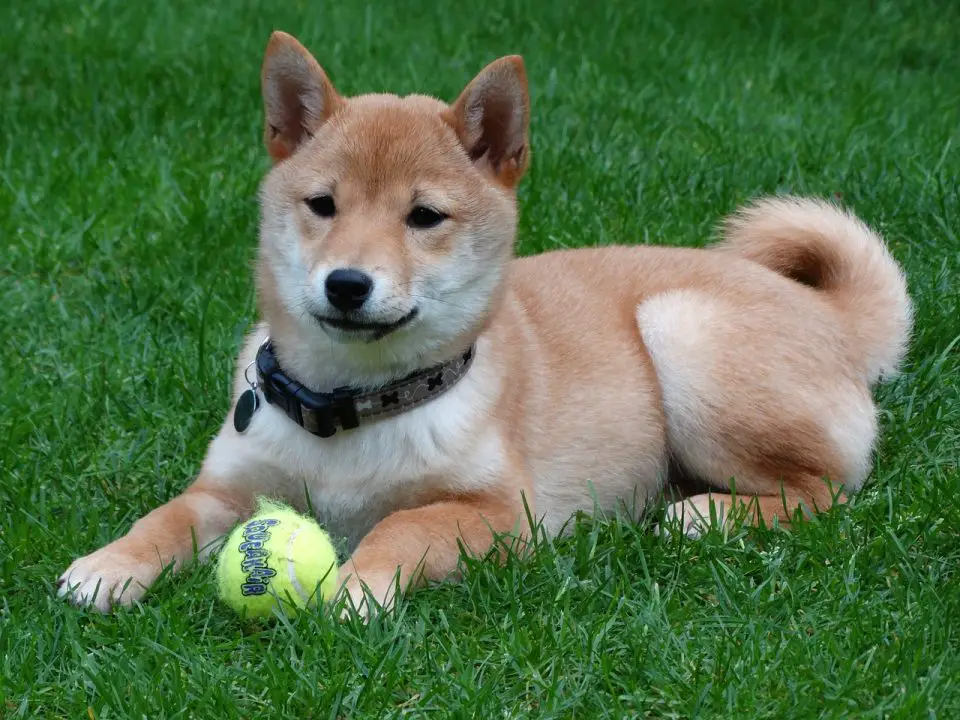Shiba Inus are the most popular dog breed in Japan – and they’re quickly becoming a hit in America too!
They’re loyal, intelligent, and make great companions, so it’s no surprise that you may be considering adopting one into your family.
However, when it comes to adopting any animal into your home – dog, cat, or even popular reptiles like bearded dragons – it’s important to do your research.
Not every breed of dog will do well with every type of family.
Shiba Inus, for example, are good family dogs, but they may display dominant tendencies over cats and other dogs, especially if they weren’t raised together.
Another important question to ask, especially if you or someone in your household has allergies or asthma, is where or not Shiba Inus are hypoallergenic.
Hypoallergenic: Fact or Fiction
| The short answer? Fiction – No, Shiba Inus are not hypoallergenic.
The long answer? There are really no animals that are truly hypoallergenic, and that’s due to how dog allergies work. |
How do Dog Allergies Work?
Before learning about how dog allergies work, you should learn how they don’t. It’s a common misconception that people who are allergic to dogs are allergic to their fur.
While there is a little bit of truth to this, it’s actually a bit more complex.
Pet allergies aren’t as much of a reaction to your Shiba Inus’ fur as they are to a certain organic compound known as a protein.
Proteins are similar to large cells that help your dog’s body function the right way. If you could blow one up to human size, they would look like a chain composed of building blocks known as amino acids.
These proteins can be found in your Shiba Inus’ mouth and saliva, where they are known as allergens.
When your Shiba Inu grooms themself, whether they’re licking or chewing their fur and skin, tiny pieces of salvia will remain.
The proteins in their saliva will then attach to dead skin cells – known as dander – on your Shiba Inus’ skin.
Then, when he or she sheds, the dander with the allergy-causing saliva proteins are released into the air around your house.
Since it’s impossible to fully avoid the dander in the air, you’ll end up inhaling some of it – which means that the protein will be introduced into your body.
How Your Body Reacts
 This is where your immune system comes into play. You see, your immune system is designed to keep you safe from everything from viruses to allergens.
This is where your immune system comes into play. You see, your immune system is designed to keep you safe from everything from viruses to allergens.
To do so, it uses a variety of different antibodies and chemicals to protect your body.
When it comes to allergies, your immune system will use a certain antibody that is known as Immunoglobulin E, or IgE for short.
When your Shiba Inus’ protein binds to IgE, a chemical reaction occurs, and IgE produces a certain compound known as histamine that acts to help keep your body safe from the protein.
In doing so, histamine also causes the allergic reaction you’re familiar with – itchy and watery eyes, coughing, sneezing, and runny nose.
So now since you know how dog allergies work, you can see that any do that grooms itself is going to cause some allergies. However, not every dog is created equal.
They all have different fur types, skin textures, and even grooming habits.
Are Some Dogs Better Than Others for Allergies?
So, while no dogs are hypoallergenic, some are better for allergy sufferers than others.
Shiba Inus have a thick, dual-layer coat comprised of fur and guard hairs.
They also blow their coats – which means completely shed the fur in order to develop a seasonal coat that best meets their needs – twice a year.
As a result, Shiba Inus aren’t the best dogs for allergies. They’ll need to groom more often than other breeds, which means more shedded dander and more saliva.
Here are some of the best dog breeds for allergy sufferers:
American Hairless Terrier
As the name says, this breed is hairless. While fur doesn’t directly cause allergies as we talked about above, it can worsen them.
Since this dog is furless, they won’t groom themselves as often, which means less salvia and less sneezing for you.
Hairless Peruvian Inca Orchid
Another hairless breed, this dog is also great for allergy sufferers.
Poodles
Due to their thickly coiled hair, much of the shedded hair and dander of a poodle gets caught in their hair and are never released into the environment.
This means that with regular grooming to remove the trapped debris, your allergies will be reduced.
You may notice that these three dog breeds have a few characteristics in common.
If you’re not interested in adopting any of them, but still want a dog that is close to hypoallergenic as possible, here is what to look for and why it’s so important:
Wirey or Coily Fur
When your dog’s fur is thick, such as with a poodle, it tends to trap any dander or shedded hair. As a result, fewer allergens will be released into the air.
Instead, regular brushing and washing will help ease the dander from your dog’s fur, discarding it instead of leaving it in the air for you to inhale.
No Fur

The thicker and curler your dog’s hair, the less severe your allergies will be.
When your dog has no fur, such as the hairless breeds mentioned above, they won’t need to groom as often.
This means that less salvia is being attached to their dander, which equals more allergy-free days for you.
Hair Instead of Fur
While we may use them interchangeably, fur and hair aren’t exactly the same things.
Fur is shorter and doesn’t constantly grow, which means it sheds more often.
Hair, however, is more similar to your own hair. While it does still shed, it’s not as often. It also continuously grows.
How to Improve Pet Allergies
The best way to reduce pet allergens in your household is to provide the best care possible for your Shiba Inu.
While you can’t change their biology or coats, you can help reduce any excessive shedding.
First, make sure that your Shiba Inu has a proper diet.
When it comes to your dog, they are what they eat, and if they’re eating unhealthy, their coat will reflect it.
Dogs are omnivores, which means that they need nutrients from both plants and animals. Without the right diet, your Shiba Inu’s fur may appear dull and will shed in large clumps.
Their skin will also be dry and irritated, resulting in more scratching and biting. Both these can increase the likelihood of an allergic reaction.
To help keep your Shiba Inu’s coat healthy, try to make sure that they get enough of each of these vitamins each and every day:
- Biotin
- Vitamin E
- Omega-6
- Omega-3
- Copper
- Folic acid
You can also talk to your vet about the proper diet and possible multivitamins if you are concerned.
Next, groom your Shiba Inu regularly
While your dog’s fur won’t trap allergens the way a poodle’s might, regular grooming can still help reduce your allergic reaction.
You should brush your Shiba Inu every day – or at least every other day – to help remove any loose fur or dander.
You should also bathe your Shiba Inu once every other week or as needed. Bathing them too often, however, will result in dry skin which will lead to more shedding.
You can also invest in special moisturizers and shampoos for dry skin.
Finally, invest in different technologies around your house to help improve allergies.
One of the best things you can do around your house to reduce the strain of allergies is to purchase an air filter.
Not only will this help reduce dog allergens in the hair but also other allergens such as dust and mold. Regular dusting and vacuuming can also help.
Final Thoughts: Are Shiba Inus Hypoallergenic
 Shiba Inus can be great dogs, especially when adopting into your family young.
Shiba Inus can be great dogs, especially when adopting into your family young.
With proper socialization, training, and care, they can be great family dogs and can even be taught to coexist with your other pets despite their dominant personalities.
They’re loyal, playful, and agile dogs, so it comes as no surprise that Shiba Inus are quickly becoming one of the most popular dogs in the world.
Even though Shiba Inus are the most allergen-friendly dog, you don’t have to miss out on the experience of owning one just because you have allergies.
While there are some breeds of dogs that are better for allergy sufferers, no dog is truly hypoallergenic.
As a result, with the proper grooming habits, you can own a Shiba Inu – or any other dog you want – with reduced allergic reactions.
Outside of regular grooming, however, Shiba Inus require a lot of attention. They need at least one hour of exercise every day as well as plenty of mental stimulation due to their high intelligence.
Make sure to continue doing your research outside of grooming habits and care to find out if a Shiba Inu is the right pet for your family.
